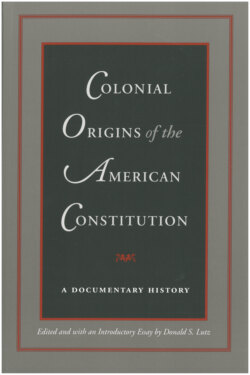Читать книгу Colonial Origins of the American Constitution - Группа авторов - Страница 17
На сайте Литреса книга снята с продажи.
Оглавление10
[The Massachusetts Agreement on the Legislature]
May 9, 1632
The first formal specification of Massachusetts political institutions, this ordinance, passed at a meeting of the General Court, ratifies the existence of the body passing it. Although the document is brief, a careful reading reveals that the basics of a government are established, which makes it a protoconstitution. Note, however, that the colony already has a functioning legislature, which represents an earlier assembly of the people. In this respect it is typical of many early foundation documents in that the legal founding follows the de facto operation of institutions.
Text taken from N. B. Shurtleff, ed., Massachusetts Colonial Records: Vol. I, Records of the Governor and Company of the Massachusetts Bay Colony in New England, 1628–1686 (Boston, 1853–54), 95–96. For an introductory discussion on this and other colonial documents concerning representation, see Michael Kammen, Deputyes & Libertyes: The Origins of Representative Government in Colonial America (New York: Alfred A. Knopf, 1969).
A General Court, holden att Boston, May 9th, 1632
| Present, The Governor, | Mr. Nowell, |
| Deputy Governor, | Mr. Pinchon, |
| Mr. Ludlowe, | S. Bradstreete |
It was generally agreed upon by erection of hands, that the Governor, Deputy Governor, & Assistants should be chosen by the whole Court of Governor, Deputy Governor, Assistants, & freemen, and that the Governor shall alwaies be chosen out of the Assistants.
John Winthrop, Esq, was chosen to the place of Governor (by the generall consent of the whole Court, manefested by erection of hands) for this yeare nexte ensueing, & till a newe be chosen, & did, in presence of the Court, take an oath to his said place belonging ...
It was ordered, that there should be two of every plantation appointed to conferre with the Court about raiseing of a publique stocke ...
It was ordered, that the towne of Waterton shall have that priviledge and interest in the [fish] weir they have built upp the Charles Ryver, according as the Court hereafter shall thinke meete to confirme unto them.
